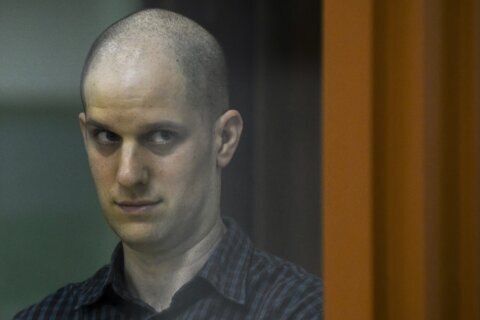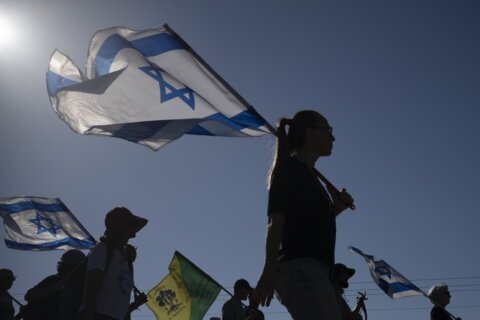The Lebanese militant group Hezbollah fired hundreds of rockets toward northern Israel on Wednesday, hours after an Israeli airstrike killed a senior commander — the hightest-ranking member of the group to die in eight months of fighting.
The Israeli military said some of the 215 projectiles were intercepted, while others ignited brush fires. There were no immediate reports of casualties. Hezbollah said it fired missiles and rockets at two military bases and vowed to intensify its attacks in response to Israel’s killing of Taleb Sami Abdullah.
Hezbollah, an Iran-backed ally of the Palestinian group Hamas, has recently been striking further inside Israel and introducing new and more advanced weaponry. Israeli warplanes have bombed deep inside Lebanon. Hezbollah says it will only stop the attacks if there is a truce in Gaza.
The pressure on Israel’s northern border came as U.S. Secretary of State Antony Blinken said mediators are trying to close the deal for an elusive cease-fire and hostage release in Gaza. Hamas has requested numerous changes to a U.S.-backed proposal — some of which Blinken said were “workable” and some not.
Hamas says its “amendments” aim to guarantee a permanent cease-fire and complete Israeli troop withdrawal from Gaza. The cease-fire proposal announced by U.S. President Joe Biden includes those provisions, but Hamas has expressed wariness whether Israel will implement the terms.
Israel’s war against Hamas in Gaza has killed more than 37,100 people, according to Gaza’s Health Ministry, which does not distinguish between combatants and civilians in its count. Palestinians are facing widespread hunger because the war has largely cut off the flow of food, medicine and other supplies. U.N. agencies say over 1 million in Gaza could experience the highest level of starvation by mid-July.
Israel launched the war after Hamas’ Oct. 7 attack, in which militants stormed into southern Israel, killed some 1,200 people — mostly civilians — and abducted about 250.
Currently:
— What are the main sticking points in the cease-fire talks between Israel and Hamas?
— Report by UN-backed experts cites crimes by Israeli forces and Palestinian militants starting 0ct. 7.
— Hezbollah vows to intensify attacks against Israel after an airstrike kills a senior commander.
— Blinken says some of Hamas’ proposed changes to a cease-fire plan in Gaza are workable and some are not.
— Netanyahu’s top rival left Israel’s war Cabinet. How does that affect the prime minister and Gaza?
— Yemen’s Houthi rebels launch boat-borne bomb attack against Greek-owned ship in Red Sea.
Follow AP’s coverage of the war in Gaza at https://apnews.com/hub/israel-hamas-war
Here’s the latest:
Voices of displaced Palestinians in Gaza: jaded hopes for a cease-fire despite war’s bloody toll
DEIR AL-BALAH, Gaza Strip — Weary after eight months of war, frustrated Palestinians displaced from their homes in Gaza said Wednesday they are cautiously hoping for a cease-fire.
Some are more skeptical than others, as previous moments of optimism have been dashed by differences between Israel and Hamas.
“We are psychologically tired,” said Etaf Abdel Bari, a displaced woman living in central Gaza’s Deir al-Balah. “They negotiated a lot, to no avail? We are not a toy in their hands. Our sons, daughters, and families killed without a reason. For what?”
More than 1 million people have fled Israel’s invasion of the southern Gaza city Rafah, scattering across southern and central Gaza into new tent camps or crowding into schools and homes.
“Every day there is a truce, there is no truce. We want a solution. We want to return to our homes,” said a displaced man, Salama Abu al-Qumbuz. “We are tired of this life, sleeping in the street, transporting water. Our lives have become very boring.”
The United Nations says over one million people in Gaza face desperate hunger and don’t have enough clean drinking water.
Other residents of Deir al-Balah took a more cynical view of the back-and-forth truce talks.
“I expect the war to continue. There are no negotiations,” said Abu Jamil al-Maqadma. “The negotiations are false.”
Palestinian shot and severely wounded in Jerusalem’s Old City during an argument with Israelis, including off-duty troops, authorities say
JERUSALEM — A Palestinian man was shot and severely wounded when a group of Israelis opened fire during an argument with a group of men in Jerusalem’s Old City on Wednesday, police and hospital officials said, the latest spasm of violence in the already tense district.
Four armed Israeli men — an off-duty soldier, two off-duty reservists and a civilian — got into an altercation with Palestinians that included throwing objects and physical violence, according to the police. Three other men were injured.
“Those involved fired shots, some of which are suspected to have hit at least one of those involved,” the police report said. The man was taken to a hospital for medical treatment. Israeli media reported he was a shop owner in the Old City.
One of the soldiers who opened fire claimed he felt threatened during the episode, police said. The shooting is under investigation and because a soldier was involved, a report was sent to the army’s criminal investigation unit. There was no indication this was a terrorist attack, police said.
Video posted on social media shows the wounded man bleeding on the ground in a narrow shop-lined street as people shouted at each other, including at least three armed Israelis. Police rush in and seek to separate the groups. Bystanders use pieces of cloth to stem the man’s bleeding.
The shooting in Jerusalem, the emotional heart of the Israeli-Palestinian conflict, took place as tensions are high over the war in Gaza. Last week, thousands of ultranationalist Israelis marched through the Old City in an annual procession, some chanting racist slogans. Police said they arrested 18 marchers “on suspicion of violent crimes, assault and threats and disorderly conduct.”
Father of freed Israeli hostage recounts how fear and uncertainty has turned to relief
TEL AVIV, Israel — Mikhail Kozlov worried his son would be unrecognizable from eight months in captivity since being abducted into Gaza during the Oct. 7 Hamas attack.
The 53-year-old father spoke to The Associated Press on Tuesday, days after his son Andrey, 27, was rescued with three other hostages by Israeli forces from central Gaza.
“We were very afraid that we would see someone else, but this is the same person, and he talks about everything with optimism. He communicates with us very willingly, laughs and jokes,” said Kozlov.
For Israel, the most successful hostage rescue so far brought nationwide elation and removed some of the stain from the army’s unprecedented collapse on Oct. 7, when Palestinian militants killed some 1,200 people and took approximately 250 others hostage.
For Palestinians, however, the rescue marked a day of horror. The operation sent hundreds of dead and wounded flooding into already beleaguered hospitals. Palestinian health officials say at least 274 Palestinians, including dozens of women and children, were killed in the operation.
While Kozlov says his son is smiling and looks physically well, Andrey told his parents there are things he’ll never divulge about his time in captivity.
What he’s described so far involved often harsh conditions, crammed into a small room with two of the other rescued hostages, at times with their hands and feet bound.
If they did anything wrong they were punished, such as being forced to lie under blankets in the heat for hours until they became dehydrated, said Kozlov. They could also speak only in whispers, not allowed to communicate with each other.
Since being rescued, his son is most preoccupied with the other hostages, especially since the guards told him his conditions were “very good” compared to the others, said Kozlov.
About 120 hostages remain in Gaza, with 43 pronounced dead. Those believed to still be alive include about 15 women, two children under age 5 and two men in their 80s.
Cease-fire negotiations have been at an impasse for months.
Kozlov said that even if a deal was reached, his son wouldn’t have been among the first released, with women, the injured and elderly as priorities.
He was doubtful he’d ever see his child again.
“This is very emotional because we weren’t counting on this outcome,” he said.
Blinken says some of Hamas’ proposed changes to a cease-fire plan in Gaza are workable and some not
DOHA, Qatar — U.S. Secretary of State Antony Blinken said Wednesday that mediators would keep trying to close an elusive cease-fire deal after Hamas proposed numerous changes to a U.S.-backed plan, some of which he said were “workable” and some not.
The back-and-forth laid bare frustration over the difficulty of reaching an accord that can bring an end to eight months of war that has decimated Gaza, killed tens of thousands of Palestinians and left scores of Israeli hostages still languishing in militant captivity. Previous moments of optimism have been repeatedly dashed by the differences between the two sides.
The cease-fire proposal has global support but has not been fully embraced by Israel or Hamas. Blinken did not spell out what changes Hamas was seeking but he said the mediators — Qatar, Egypt and the U.S. — will keep trying to “close this deal.” He put the onus on Hamas, accusing it of changing its demands.
“Hamas has proposed numerous changes to the proposal that was on the table. … Some of the changes are workable. Some are not,” Blinken told reporters in Qatar. “I believe that they (the differences) are bridgeable, but that doesn’t mean they will be bridged because ultimately Hamas has to decide.”
The Palestinian militant group says the “amendments” aim to guarantee a permanent cease-fire and complete Israeli troop withdrawal from Gaza.
Those provisions are included in the proposal announced by U.S. President Joe Biden, but Hamas has expressed wariness whether Israel will implement the terms. And although the U.S. says Israel has accepted the proposal, Israeli Prime Minister Benjamin Netanyahu has given conflicting statements, saying Israel is still intent on its goal of destroying Hamas.
The proposal’s three-phase plan would begin with a six-week cease-fire and the release of some hostages in exchange for Palestinian prisoners. Israeli forces would withdraw from populated areas and Palestinian civilians would be allowed to return to their homes. Aid distribution would also increase.
At the same time, negotiations would start over the second phase, which is to bring “a permanent end to hostilities” and “full withdrawal” of Israeli troops from Gaza in exchange for the release of all remaining hostages.
A major hitch for both sides appears to be the negotiations for the second phase. Phase three would see the launch of a reconstruction plan for Gaza and the return of remains of deceased hostages.
Over 200 rockets fired from Lebanon after Israel kills Hezbollah commander
BEIRUT — Hundreds of rockets were fired from Lebanon toward northern Israel on Wednesday morning, hours after Israeli airstrikes killed four officials from the militant Hezbollah group including a senior military commander.
The Israeli military said that about 215 projectiles were detected. It said that some were intercepted, and that several fires were caused by the strikes.
Taleb Sami Abdullah, 55, who was known within Hezbollah as Hajj Abu Taleb, was the most senior commander killed since fighting began eight months ago. His death came amid rising escalation along the Lebanon-Israel border that has seen Hezbollah intensify its attacks on northern Israel while Israeli airstrikes have struck deep inside Lebanon.
Hezbollah’s Al-Manar TV reported that rockets were being fired from south Lebanon into northern Israel. Sirens were sounded in northern Israel, according to Israeli media.
A Hezbollah official said Abdullah was the most senior commander to be killed in Lebanon since the latest round of violence along the Lebanon-Israel border began in October adding that he was the commander of the group’s Nasr Unit that is charge of parts of south Lebanon close to the Israeli border.
The Israeli strike destroyed a house in Jwaya where Abdullah and three other officials were holding a meeting, about 10 kilometers (6 miles) from the border, late on Tuesday.
The Hezbollah official, who spoke on condition of anonymity in line with regulations, said Abdullah was more senior than a commander who was killed in January, Wissam al-Tawil.
Israeli airstrikes on Lebanon have killed over 400 people, most of them Hezbollah members, but the dead also include more than 70 civilians and non-combatants. On the Israeli side, 15 soldiers and 10 civilians have been killed since the war in Gaza began.
— AP writer Bassem Mroue contributed.
Lebanese militant group Hezbollah says a senior commander has been killed
BEIRUT — Lebanese militant group Hezbollah announced early Wednesday the death of one of its commanders, identified as Taleb Sami Abdullah or “Hajj Abu Taleb.”
The group did not give details on the location and circumstances of his death, but identified him as a “martyr on the road to Jerusalem,” the term it uses for those killed in the current conflict with Israel. Hezbollah published a photo of Abdullah alongside Wissam al-Tawil, another senior commander killed in an Israeli strike in January.
The Israeli military did not immediately comment on Abdullah’s death.
Cross-border fighting between Israel and Hezbollah has intensified in the past month, as Israel launched its offensive into the key southern Gaza city of Rafah. Hezbollah has also stepped up its attacks, striking deeper inside Israel and introduced new and more advanced weaponry.
Israeli drone strikes have killed hundreds of Hezbollah members since exchanges of fire began on Oct. 8, a day after the Israel-Hamas war began in Gaza.
Since then, more than 400 people have been killed in Lebanon, most of them Hezbollah members. The dead also include more than 70 civilians and non-combatants. On the Israeli side, at least 15 soldiers and 10 civilians have been killed.
Copyright © 2024 The Associated Press. All rights reserved. This material may not be published, broadcast, written or redistributed.







